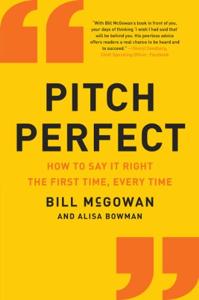
Want to learn the ideas in Pitch Perfect better than ever? Read the world’s #1 book summary of Pitch Perfect by Bill McGowan here.
Read a brief 1-Page Summary or watch video summaries curated by our expert team. Note: this book guide is not affiliated with or endorsed by the publisher or author, and we always encourage you to purchase and read the full book.
Video Summaries of Pitch Perfect
We’ve scoured the Internet for the very best videos on Pitch Perfect, from high-quality videos summaries to interviews or commentary by Bill McGowan.
1-Page Summary of Pitch Perfect
Overview
Many people have told me to imagine my audience in their underwear when I’m nervous before a presentation.
It’s true that there are plenty of techniques out there to help you communicate your ideas. However, they will only be distractions from conveying your message effectively. You should avoid these common mistakes and focus on communicating well with others if you want to climb the corporate ladder. Good communication skills will also allow you to work more efficiently because you’ll have extra time for executing your ideas instead of clarifying or answering questions about them.
These communication skills will help you in your personal life, whether you’re trying to have a more engaging conversation with friends or relatives.
You’ll also discover: why some people aren’t promoted at their jobs, how to stop that annoying shaky voice when you’re giving a speech, how to keep your audience interested in what you have to say, why Steve Jobs was an excellent communicator and speaker, how to be a better conversationalist with others and more.
Big Idea #1: In many situations, you have just one chance to deliver the right message.
There are times when you need to be very effective in your communication. For example, at work or with friends and family members.
When it comes to work, your communication skills are critical. You need them to impress your superiors and get promoted. There is a limited number of opportunities for you to do that in your career.
For example, imagine you’re asked for your opinion on why the company is not growing. If you don’t speak up and avoid eye contact with your boss, then you will be overlooked for a promotion. On the other hand, if you reveal that the business structure itself is weak and threatens growth, then this may offend your boss and hurt any chances of getting promoted. In either case, poor communication skills are an obstacle to being promoted in many companies today.
If you make your pitch perfect on the first try, then there will be less confusion and fewer requests for clarification. This means that you’ll have more time to focus on executing the idea itself.
For example, let’s say you want your child to do his homework. But he doesn’t listen to you the first time. You then have to spend more time trying to convince him again and again until eventually it becomes a waste of both your and his time.
Communication is important in order to get results. For example, if you have a great idea for your company but aren’t good at communicating it, people will reject it simply because they can’t understand what you’re trying to say. You need to focus on the benefits of your idea instead of how you came up with it.
Big Idea #2: Start with a concise, compelling statement to make listeners want to know more.
Whenever you’re giving a presentation or starting up a conversation, do you feel like people could lose interest at any moment?
So, I guess you are right.
You need to capture your audience’s attention in the first 30 seconds, or else they’ll lose interest. If you can do that, then they’ll keep listening and not be distracted by their phones or anything else.
You want to avoid that. However, how can you do that? First, you should dive right in and talk about your topic instead of talking about why you’re giving the presentation. If you spend a minute at the beginning explaining what your presentation is going to be about, it will sound like every other speaker and people will think there’s nothing new for them to learn from what you have to say.
For example, consider what you would do if a presenter spent time talking about each point she’ll discuss later. You wouldn’t be at the edge of your seat.





